六年级(下册)重点单词及句子
小学英语六年级下册句子及词语

【导语】假如⽣活是⼀条河流,愿你是⼀叶执著向前的⼩⾈;假如⽣活是⼀叶⼩⾈,愿你是个风⾬⽆阻的⽔⼿。
以下是®⽆忧考⽹为⼤家整理的《⼩学英语六年级下册句⼦及词语》供您查阅。
Unit1 How tall are you?⼀、重点单词:tall—taller更⾼的、short—shorter 更矮的、 strong—strong更强壮的、old—older年龄更⼤的、young—younger 更年轻的、big—bigger更⼤的heavy—heavier 更重的、 long—longer 更长的、 thin—thinne更瘦的、small—smaller 更⼩的、low—lower更低的、smart—smarter更聪明的dinosaur恐龙、 hall⼤厅、meter ⽶、than⽐、 both 两个都、 kilogram千克,公⽄、 countryside乡村、shadow阴影,影⼦、 become开始变得,变成⼆、重点句式:1、That's the tallest dinosaur in this hall.那是这个厅⾥的恐龙。
2、You're older than me. 你⽐我⼤。
3、How tall are you ?你有多⾼? I'm 1.65 metres.我⾝⾼1.65⽶。
4、What size are your shoes ?你穿多⼤号的鞋?5、My shoes are size 37. 我穿37号的鞋。
6 、Your feet are bigger than mine .你的脚⽐我的⼤。
7、How heavy are you ?你有多重? I'm 48 kilograms .我体重48公⽄。
8、It's taller than both of us together .它⽐我们俩加在⼀起还⾼。
三、知识点:1、形容词变为⽐较级的变化规则:(1)⼀般情况下,在形容词的词尾直接加er。
六年级下册英语重点单词句子

六年级下册英语重点单词句子一、重点单词。
1. younger [ˈjʌŋɡə(r)] 形容词(adj.),比较级形式,意为“更年轻的;更幼小的”。
2. older [ˈəʊldə(r)] 形容词(adj.),比较级形式,意为“更年长的;更旧的”。
3. taller [ˈtɔːlə(r)] 形容词(adj.),比较级形式,意为“更高的”。
4. shorter [ˈʃɔːtə(r)] 形容词(adj.),比较级形式,意为“更短的;更矮的”。
5. longer [ˈlɒŋɡə(r)] 形容词(adj.),比较级形式,意为“更长的”。
6. thinner [ˈθɪnə(r)] 形容词(adj.),比较级形式,意为“更瘦的”。
7. heavier [ˈheviə(r)] 形容词(adj.),比较级形式,意为“更重的”。
8. bigger [ˈbɪɡə(r)] 形容词(adj.),比较级形式,意为“更大的”。
9. smaller [ˈsmɔːlə(r)] 形容词(adj.),比较级形式,意为“更小的”。
10. stronger [ˈstrɒŋɡə(r)] 形容词(adj.),比较级形式,意为“更强壮的”。
11. yesterday [ˈjestədeɪ] 名词(n.),意为“昨天”。
12. last [lɑːst] 形容词(adj.),意为“上一个的;刚过去的”;也可作动词(v.),意为“持续”。
13. before [bɪˈfɔː(r)] 介词(prep.)/副词(adv.),意为“在……之前”。
14. hotel [həʊˈtel] 名词(n.),意为“旅馆”。
15. fixed [fɪkst] 动词(v.),fix的过去式,意为“修理;固定”。
16. broken [ˈbrəʊkən] 形容词(adj.),意为“破损的;弄坏了的”。
17. lamp [læmp] 名词(n.),意为“台灯”。
六年级英语下册期末总复习《2单元》必记知识点

六年级英语下册期末总复习《2单元》必记知识点一、重点单词•地点类:library(图书馆)、post office(邮局)、hospital(医院)、bookstore (书店)、cinema(电影院)•方位及动作类:turn left(左转)、turn right(右转)、go straight(直走)•其他常用词汇:cleaned(打扫的过去式)、stayed(停留的过去式)、washed (洗的过去式)、watched(看的过去式)、had(have的过去式)、slept(睡觉的过去式)、read(读的过去式)、saw(看见的过去式)二、重点词组•want to do sth(想要做某事)•get to(到达)•take a walk(散步)•at the weekend(在周末)•on foot(步行)三、重点句型1.询问地点:•Where would you like to go this weekend?(这个周末你想去哪里?)2.询问到达方式:•How can I get there?(我怎样才能到达那里?)•You can turn left at the bookstore and then go straight along the street.(你可以在书店左转,然后沿着这条街一直走。
)3.询问过去活动:•What did you do last weekend?(你上周末做了什么?)•I cleaned my room and washed my clothes on Saturday.(我星期六打扫房间,还洗了衣服。
)四、语法知识•学习使用情态动词“would”来表示“想要做某事”。
•学习使用“where”、“how”等疑问词来询问地点和方式。
•学习使用“take a walk”等短语来表示休闲活动。
•过去进行时的基本结构:was/were + 现在分词(V-ing),表示过去某个时间(段)正在发生的动作/状态。
人教版六年级英语下册各单元必背词汇和句型
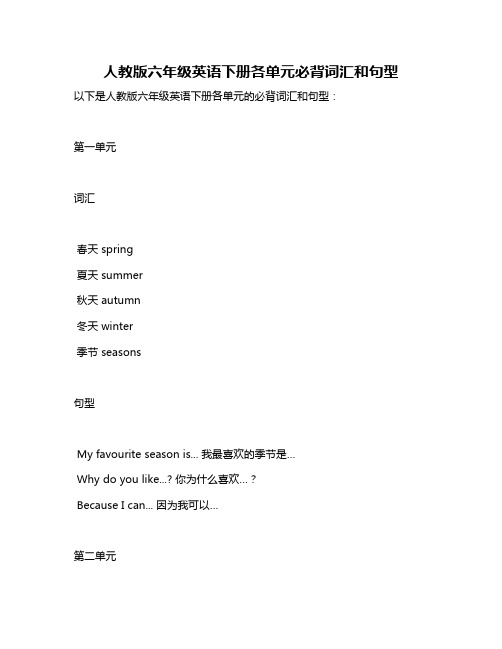
人教版六年级英语下册各单元必背词汇和句型以下是人教版六年级英语下册各单元的必背词汇和句型:第一单元词汇春天 spring夏天 summer秋天 autumn冬天 winter季节 seasons句型My favourite season is... 我最喜欢的季节是…Why do you like...? 你为什么喜欢…?Because I can... 因为我可以…第二单元词汇游泳 swim滑冰 skate放风筝 fly a kite堆雪人 make a snowman季节活动 seasonal activities句型What do you do in the...? 你在…做什么?I usually... 我通常…Do you often...? 你经常…吗?Yes, I do. / No, I don’t. 是的,我经常。
/ 不,我不经常。
第三单元词汇星期一 Monday星期二 Tuesday星期三 Wednesday星期四 Thursday星期五 Friday星期六 Saturday星期日 Sunday星期 weekdays星期天 weekends句型What do you have on...? 你星期几有什么课?I have... 我星期几有…课。
When do you have...? 你什么时候有…课? I have... on... 我在星期几有…课。
第四单元词汇电影 movies公园 parks图书馆 libraries博物馆 museums商店 shops饭店 restaurants医院 hospitals学校 schools银行 banks邮局 post offices公共场所 public places 句型。
六年级下册英语单词表和句子表
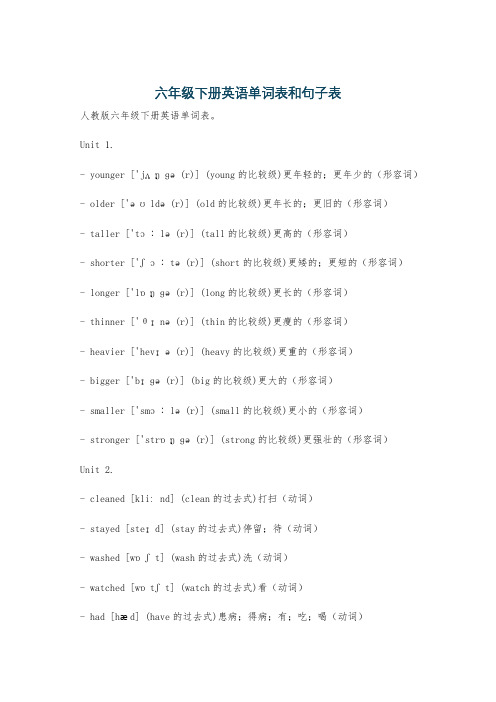
六年级下册英语单词表和句子表人教版六年级下册英语单词表。
Unit 1.- younger ['jʌŋɡə(r)] (young的比较级)更年轻的;更年少的(形容词)- older ['əʊldə(r)] (old的比较级)更年长的;更旧的(形容词)- taller ['tɔːlə(r)] (tall的比较级)更高的(形容词)- shorter ['ʃɔːtə(r)] (short的比较级)更矮的;更短的(形容词)- longer ['lɒŋɡə(r)] (long的比较级)更长的(形容词)- thinner ['θɪnə(r)] (thin的比较级)更瘦的(形容词)- heavier ['hevɪə(r)] (heavy的比较级)更重的(形容词)- bigger ['bɪɡə(r)] (big的比较级)更大的(形容词)- smaller ['smɔːlə(r)] (small的比较级)更小的(形容词)- stronger ['strɒŋɡə(r)] (strong的比较级)更强壮的(形容词)Unit 2.- cleaned [kliːnd] (clean的过去式)打扫(动词)- stayed [steɪd] (stay的过去式)停留;待(动词)- washed [wɒʃt] (wash的过去式)洗(动词)- watched [wɒtʃt] (watch的过去式)看(动词)- had [hæd] (have的过去式)患病;得病;有;吃;喝(动词)- had a cold感冒。
- slept [slept] (sleep的过去式)睡觉(动词)- read [red] (read的过去式)读;阅读(动词)- saw [sɔː] (see的过去式)看见(动词)- last [lɑːst] 最近的;上一个的(形容词);最后(副词)- yesterday ['jestədeɪ] 昨天(名词)- before [bɪ'fɔː(r)] 在……之前(介词、连词)Unit 3.- went [went] (go的过去式)去(动词)- camp [kæmp] 野营(动词、名词)- went camping去野营。
六年级下册第二单元英语知识点

六年级下册第二单元英语知识点一、重点单词。
1. 形容词。
- clean(干净的) - dirty(脏的)- healthy(健康的) - unhealthy(不健康的)- strong(强壮的) - weak(虚弱的)- happy(高兴的) - sad(悲伤的)2. 与生活习惯相关的名词。
- habit(习惯)- exercise(锻炼;练习)- sleep(睡觉)- junk food(垃圾食品)- vegetable(蔬菜)- fruit(水果)3. 频度副词。
- always(总是)- usually(通常)- often(经常)- sometimes(有时)- never(从不)二、重点短语。
1. 与健康生活方式相关。
- do exercise(做锻炼)- eat vegetables(吃蔬菜)- eat fruit(吃水果)- drink milk(喝牛奶)- go to bed early(早睡)- get up early(早起)- keep clean(保持干净)- wash hands(洗手)2. 表示频率的短语。
- once a day(一天一次)- twice a week(一周两次)- three times a month(一个月三次)三、重点句型。
1. 描述健康习惯。
- I often do exercise. It makes me strong.(我经常做锻炼。
它让我强壮。
)- She always eats vegetables. They are good for her health.(她总是吃蔬菜。
它们对她的健康有好处。
)2. 描述不健康习惯及影响。
- He sometimes eats junk food. It's bad for his body.(他有时吃垃圾食品。
这对他的身体有害。
)- They never go to bed early. So they are often tired in class.(他们从不早睡。
六年级下册英语好词好句

六年级下册英语好词好句六年级下册英语教材中的好词好句可以帮助学生提升语言表达能力,培养良好的写作习惯。
以下是一些适用于六年级学生的英语好词好句示例:基础问候与日常对话1. Greetings- Good morning/afternoon/evening, class!- Hi/Hello, how are you?- Have a nice day!2. Weather-related phrases- What's the weather forecast for tomorrow?- It's raining cats and dogs outside.- The sun is shining brightly today.3. Expressions- Time flies when you're having fun.- Every cloud has a silver lining.- Practice makes perfect.4. Sentences from lessons- I'm going to the library after school.- We should protect the environment because it's our duty.- My hobby is reading; it broadens my knowledge.5. Proverbs & Wise Sayings- Where there's a will, there's a way.- Actions speak louder than words.- A friend in need is a friend indeed.6. Descriptive Phrases- The colorful rainbow painted the sky after the rain.- She had a heart full of kindness and a smile brighter than the sun. - He reads books voraciously, expanding his horizons with each page.结构性句型- Comparisons- Mike runs fast, but I run faster.- This book is more interesting than the last one I read.- Conditional Sentences- If I were a bird, I would fly high in the sky.- I'll help you if you promise to study harder.- Questions- Could you please pass me the salt?- How do you usually spend your weekends?- Giving Opinions- In my opinion, teamwork is essential for success.- I think it's important to eat a healthy breakfast.。
新人教版(PEP)小学英语六年级下册各单元知识点总结
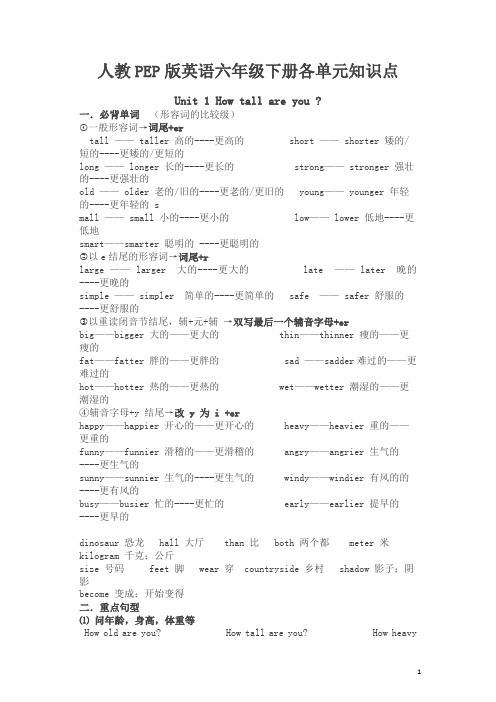
人教PEP版英语六年级下册各单元知识点Unit 1 How tall are you ?一.必背单词(形容词的比较级)①一般形容词→词尾+ertall —— taller 高的----更高的 short —— shorter 矮的/短的----更矮的/更短的long —— longer 长的----更长的 strong—— stronger 强壮的----更强壮的old —— older 老的/旧的----更老的/更旧的 young—— younger 年轻的----更年轻的 small —— small 小的----更小的 low—— lower 低地----更低地smart——smarter 聪明的 ----更聪明的②以e结尾的形容词→词尾+rlarge —— larger 大的----更大的 late —— later 晚的----更晚的simple —— simpler 简单的----更简单的 safe —— safer 舒服的----更舒服的③以重读闭音节结尾,辅+元+辅→双写最后一个辅音字母+erbig——bigger 大的——更大的 thin——thinner 瘦的——更瘦的fat——fatter 胖的——更胖的 sad ——sadder难过的——更难过的hot——hotter 热的——更热的 wet——wetter 潮湿的——更潮湿的④辅音字母+y 结尾→改 y 为 i +erhappy——happier 开心的——更开心的 heavy——heavier 重的——更重的funny——funnier 滑稽的——更滑稽的 angry——angrier 生气的----更生气的sunny——sunnier 生气的----更生气的 windy——windier 有风的的----更有风的busy——busier 忙的----更忙的 early——earlier 提早的----更早的dinosaur 恐龙 hall 大厅 than 比 both 两个都 meter 米kilogram 千克;公斤size 号码 feet 脚 wear 穿 countryside 乡村 shadow 影子;阴影become 变成;开始变得二.重点句型⑴ 问年龄,身高,体重等How old are you? How tall are you? How heavyare you?--- I’m _______ (years old). --- I’m ______metres tall. ---- I’m ______ kilograms .⑵ 问物品的情况:① How large is your room? 你的房间有多大?It’s ______ m (square meters.) 有___平方米。
六年级下册英语前四单元重点句子和单词和语法

六年级下册英语前四单元重点句子和单词和语法Unit 1: At the weekendKey Sentences:1. What do you do at the weekend?2. I often go to the park.3. I sometimes play football with my friends.4. I always visit my grandparents.5. I never watch TV on Sundays.Key Words:1. weekend2. often3. sometimes4. always5. never6. park7. play football8. visit9. grandparents10. watch TVGrammar:Present Simple tense:- We use the present simple to talk about habits or routines.- Affirmative: Subject + verb (base form) + Object- Negative: Subject + do/does + not + verb (base form) + Object- Interrogative: Do/Does + Subject + verb (base form) + Object?- Adverbs of frequency (always, often, sometimes, never) are used with the present simple to indicate how often something happens.Unit 2: At schoolKey Sentences:1. What do you do after school?2. I have English and Math on Mondays.3. I study Science and P.E. on Fridays.4. I play the guitar twice a week.5. I clean the classroom on Friday afternoons.Key Words:1. after school2. English3. Math4. Science5. P.E.6. play the guitar7. twice8. clean9. classroom10. FridaysGrammar:Present Simple tense:- We use the present simple to talk about scheduled events.- Adverbs of frequency (twice a week, on Fridays) can indicate the regularity of an action.- Time expressions (on Mondays, on Fridays) help specify when an action takes place.Unit 3: Family and FriendsKey Sentences:1. How many people are there in your family?2. I have one brother and one sister.3. My sister is a doctor and my brother is a teacher.4. I play basketball with my friends every Saturday.5. My best friend's name is Peter.Key Words:1. family2. brother3. sister4. doctor5. teacher6. play basketball7. friends8. every9. Saturday10. best friendGrammar:Present Simple tense:- We use the present simple to talk about facts or general truths.- This tense is also used to talk about habits or customs.- Possessive pronouns (my, your, his, her, our, their) are used to show ownership or relationships.- Adjectives (best) are used to describe relationships or friendships.Unit 4: JobsKey Sentences:1. What does your father do?2. He is a police officer.3. My mother works as a nurse.4. I want to be a firefighter in the future.5. My grandparents used to be farmers.Key Words:1. jobs2. father3. mother4. police officer5. nurse6. firefighter7. future8. grandparents9. farmers10. used toGrammar:Present Simple tense:- We use the present simple to talk about someone's occupation or profession.- Verbs (do, work, want, be) are used to describe activities or aspirations.- Modal verb (want to) is used to express desires or goals.- Past habits or states are expressed with "used to" followed by the base form of a verb.。
小学英语人教精通版六年级下册重点归纳

小学英语人教精通版六年级下册重点归纳第一单元Unit1 I went to Sanya for my holidays.重点单词:Sun 太阳moon月亮star星星Learn 学习;学到word 单词;词blackboard黑板say 说subject学科but 但是yesterday昨天why 为什么use用重点短语:1.by plane 乘飞机2.at night 在晚上3.at home 在家里4.a lot of 很多5.go to the beach 去沙滩6.do tasks 做任务7.act in drama 表演戏剧8.stay at home 待在家里9.have a party 聚会10.enjoy Spring Festive 过春节11.listen to music 听音乐12.speak English 讲英语13.read English 读英语14.write E n glish 写英语15.talk in English n用英语交谈16.play in English 用英语玩游戏17.enjoy sunbathing享受日光浴18.have an English party举办英语聚会19.enjoy the moon and stars看月亮和醒醒20.learn from each other 互相学习。
重点句型:1. We have learned a lot of English words我. 们学了很多英语单词。
2. We learned from each other我. 们互相学习。
2.What did you do for your holidays?你假期做了什么?3.I went to Sanya.我去了三亚。
4.We are very interested in English我. 们对英语很感兴趣。
5.How did you learn English?你(们)是怎么学英语的?6.We learned English by doing things我. 们通过做事情来学英语。
六年级英语下册知识点总结

六年级下册知识点总结Unit 1 How Tall Are You?重点单词:Taller, shorter, stronger, older, younger, bigger, heavier, longer, thinner, smaller, funnier, meter, squid, lobster, shark, deep, seal, sperm whale, killer whale 重点句型:1-How tall are you?-I'm 1.60 meters tall/ I'm 160 cm.2-How heavy are you?-I'm 48 kg,-How long are your legs?-76 cm.4 -How big are your feet?-I wear size 17.5 -Who is taller than you?-Tom is taller than me.注:形容词比较级的变化规律:Unit2 What§The Matter,Mike?单词:重点Havea fever, hurt, have a cold, have a toothache, have a headache, have a sore throat, matter, sore, nose, tired, excited, angry, happy, bored, sad, medicine, a little, laugh at重点句型:1 -What's the matter with them?-The robot is tired, the stray man has a headache.-Fine. How are you?-I have a headache / fever / cold / toothache / sore throat.或have the flu.3 -What's the matter, mike?-I feel sick. I have a fever./ My throat is sore, my nose is hurt.4-How does Lisa feel?-She is tired/ sad/happy/excited.5-How are you, Liu Yun? You look sad.-I failed the math test.6-How do you / them feel? /How does he/she feel?-They feel happy./He/She feels happy.Unit 3 Last Weekend重点单词:Watch, wash, clean, play, visit, do, last, weekend, go, to, park, go to swimming, go hiking, go fishing, tongue twister, yesterday, return 重点句型:1-What did you do last weekend/yesterday?-I watched TV / washed the clothes/cleaned the room/played the football/visited grandparents/ played football/went to a park/went swimming/read a book/went fishing/went hiking/-Did you do homework yesterday?-Yes, I did./ No, I didn't.2-What did you do last weekend?-I V-ed……注:动词过去时的变化形式:1、一般情况下,动词词尾加-ed ,如:work ---worked play-played wanted--wanted act --- acted2、以不发音的-e结尾动词,动词词尾加-d,如:live-lived move——moved taste-tasted hope -hoped3、以辅音字母+y结尾的动词,把-y变为-i再加-ed,如:study-studied copy-copied cry-cried carry-carried4、以一个辅音字母结尾的重读闭音节动词,双写词尾辅音字母,再加-ed,如:stop —stopped5、不规则动词的过去式变化规律性不强,须多加记忆。
六年级下册英语前四单元重点句子和单词和语法
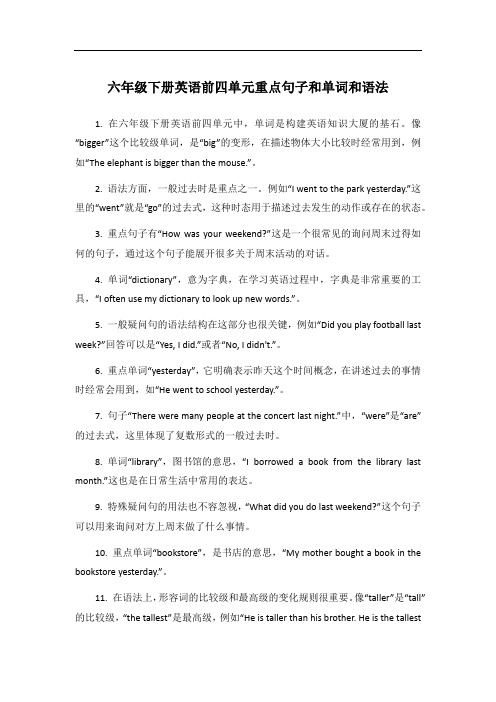
六年级下册英语前四单元重点句子和单词和语法1. 在六年级下册英语前四单元中,单词是构建英语知识大厦的基石。
像“bigger”这个比较级单词,是“big”的变形,在描述物体大小比较时经常用到,例如“The elephant is bigger than the mouse.”。
2. 语法方面,一般过去时是重点之一。
例如“I went to the park yesterday.”这里的“went”就是“go”的过去式,这种时态用于描述过去发生的动作或存在的状态。
3. 重点句子有“How was your weekend?”这是一个很常见的询问周末过得如何的句子,通过这个句子能展开很多关于周末活动的对话。
4. 单词“dictionary”,意为字典,在学习英语过程中,字典是非常重要的工具,“I often use my dictionary to look up new words.”。
5. 一般疑问句的语法结构在这部分也很关键,例如“Did you play football last week?”回答可以是“Yes, I did.”或者“No, I didn't.”。
6. 重点单词“yesterday”,它明确表示昨天这个时间概念,在讲述过去的事情时经常会用到,如“He went to school yesterday.”。
7. 句子“There were many people at the concert last night.”中,“were”是“are”的过去式,这里体现了复数形式的一般过去时。
8. 单词“library”,图书馆的意思,“I borrowed a book from the library last month.”这也是在日常生活中常用的表达。
9. 特殊疑问句的用法也不容忽视,“What did you do last weekend?”这个句子可以用来询问对方上周末做了什么事情。
六年级英语考试重点单词和句子

六年级下册重点必背英语单词六年级下册英语单词是学习英语必不可少的部分。
在这个阶段,学生需要巩固并扩大自己的英语词汇量,为高中或更高级别的英语学习做好准备。
下面将详细介绍六年级下册重点必背英语单词。
1. astronaut(n.宇航员)- a person who travels in space例句:Neil Armstrong was the first astronaut to walk on the moon.2. galaxy(n.星系)- a system of billions of stars, along with gas and dust, held together by gravitational attraction例句:The Milky Way is our galaxy.3. launch(v.发射)- to send an object into space or the air例句:They will launch a new satellite next week.4. explore(v.探索)- to travel around a place in order to learn about it例句:We explored the ancient ruins and discovered many interesting artifacts.5. orbit(n.轨道)- the path that an object follows as it goes around another object in space例句:The Earth orbits around the sun.6. solar(adj.太阳的)- relating to the sun例句:Solar energy can be used to power homes and buildings.7. satellite(n.卫星)- an object that is sent into space to revolve around the Earth, collect information, or communicate例句:The satellite provides images of the Earth's surface.8. astronautics(n.宇宙航空学)- the science and technology of space flight例句:He has a degree in astronautics.9. telescope(n.望远镜)- an optical instrument used to view distant objects 例句:He looked through the telescope and saw the stars.10. crater(n.火山口)- a large, bowl-shaped hole on the surface of a planet or moon, typically caused by an impact of a meteorite例句:The moon has many craters on its surface.11. universe(n.宇宙)- all existing matter and space considered as a whole;the cosmos例句:Scientists are still trying to understand the origins of the universe.12. meteor(n.流星)- a small body of matter from outer space that enters the Earth's atmosphere, becoming incandescent as a result of friction and appearing as a streak of light例句:We saw a shooting star, which is actually a meteor burning up in the Earth's atmosphere.13. gravity(n.重力)- the force that attracts objects toward each other, especially the force that attracts objects towards the center of the Earth例句:Gravity keeps us grounded to the Earth.14. alien(n.外星人)- a creature from outer space例句:In science fiction movies, aliens often visit Earth.15. exploration(n.探索)- the action of traveling in or through an unfamiliar area in order to learn about it例句:The team embarked on an exploration of the Amazon rainforest.16. mission(n.任务)- an important assignment carried out for a specific purpose例句:Their mission was to find a cure for the disease.17. module(n.舱段)- a self-contained unit or system within a larger system, often designed to be used in conjunction with other units例句:The lunar module landed safely on the moon.18. oxygen(n.氧气)- a colorless, odorless reactive gas that is necessary for respiration and exists as a diatomic molecule例句:We need oxygen to survive.19. atmosphere(n.大气层)- the envelope of gases surrounding the Earth or another planet例句:The atmosphere protects us from harmful radiation from the sun.20. discovery(n.发现)- the action or process of finding something new or previously unknown例句:The discovery of penicillin revolutionized medicine.21. equipment(n.设备)- the tools, machinery, and furniture needed for a particular activity or work例句:The scientists in the lab used various equipment to conduct their experiments.22. laboratory(n.实验室)- a room or building equipped for scientific research例句:She spent most of her time in the laboratory working on her thesis.23. experiment(n.实验)- a scientific procedure conducted to make a discovery or demonstrate a known fact例句:The teacher conducted an experiment to show how plants grow under different conditions.24. variable(n.变量)- a factor that can change in a mathematical orscientific study例句:Temperature is a variable that can affect the growth of plants.25. hypothesis(n.假设)- a proposed explanation for a phenomenon, often one that is based on limited evidence and subject to further investigation例句:The scientist formed a hypothesis and designed an experiment to test it.26. conclusion(n.结论)- the end or finish of an event, process, or text例句:After analyzing the data, the researchers drew the conclusion that the experiment was successful.27. evidence(n.证据)- facts or proof used to support a theory or argument例句:The fingerprints on the window were the evidence that led the police to the culprit.28. research(n.研究)- the activity of investigating a subject in detail例句:She is conducting research on the effects of climate change on local ecosystems.29. conclusion(n.结论)- the end result of a process of reasoning or a investigation例句:Based on the evidence, the court reached the conclusion that the defendant was guilty.30. theory(n.理论)- a set of principles or ideas intended to explain something, especially one that has been widely accepted例句:The theory of evolution explains how species change over time.31. innovation(n.创新)- the act or process of inventing or creating something new例句:The smartphone was a innovation that changed the way we communicate. 32. problem(n.问题)- a matter or situation that is causing difficulty, typically one that needs to be addressed or solved例句:The lack of access to clean water is a problem that affects many communities.33. solution(n.解决方案)- a way of solving a problem or dealing with a difficult situation例句:The engineers developed a solution to fix the malfunctioning equipment.34. challenge(n.挑战)- a task or situation that tests someone's skills, abilities, or endurance例句:Adapting to a new environment can be a challenge for some people.35. opportunity(n.机会)- a favorable or appropriate time or occasion例句:She seized the opportunity to further her education.36. challenge(n.挑战)- to demand effort or skill to accomplish something例句:The climb up the mountain was a real challenge.37. success(n.成功)- the achievement of something desired, planned, or attempted例句:Her hard work and determination led to her ultimate success.38. failure(n.失败)- the lack of success or the inability to achieve something例句:Every failure is a step towards success.39. effort(n.努力)- the exertion of energy to achieve a goal or complete a task例句:It takes a lot of effort to learn a new language.40.persistence(n.坚持)- the continued effort to achieve something despite difficulty or failure这些是六年级下册重点必背英语单词,通过学习和掌握这些词汇,学生可以更好地理解和使用英语,为进一步的学习打下坚实的基础。
六年级下册英语必考知识点
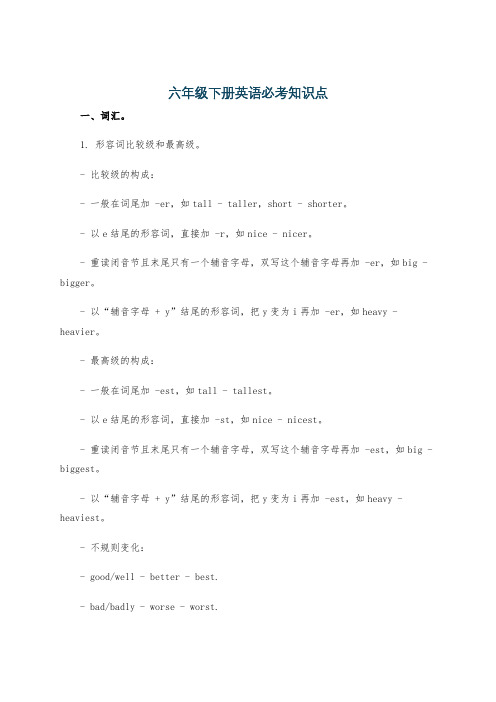
六年级下册英语必考知识点一、词汇。
1. 形容词比较级和最高级。
- 比较级的构成:- 一般在词尾加 -er,如tall - taller,short - shorter。
- 以e结尾的形容词,直接加 -r,如nice - nicer。
- 重读闭音节且末尾只有一个辅音字母,双写这个辅音字母再加 -er,如big - bigger。
- 以“辅音字母 + y”结尾的形容词,把y变为i再加 -er,如heavy - heavier。
- 最高级的构成:- 一般在词尾加 -est,如tall - tallest。
- 以e结尾的形容词,直接加 -st,如nice - nicest。
- 重读闭音节且末尾只有一个辅音字母,双写这个辅音字母再加 -est,如big - biggest。
- 以“辅音字母 + y”结尾的形容词,把y变为i再加 -est,如heavy - heaviest。
- 不规则变化:- good/well - better - best.- bad/badly - worse - worst.- many/much - more - most.- little - less - least.2. 动词的过去式。
- 规则变化:- 一般在词尾加 -ed,如play - played,clean - cleaned。
- 以e结尾的动词,加 -d,如live - lived。
- 重读闭音节且末尾只有一个辅音字母,双写这个辅音字母再加 -ed,如stop - stopped。
- 以“辅音字母 + y”结尾的动词,把y变为i再加 -ed,如study - studied。
- 不规则变化:- go - went.- see - saw.- eat - ate.- have/has - had等。
3. 重点单词。
- 职业类:doctor(医生),teacher(教师),pilot(飞行员),scientist (科学家),artist(艺术家)等。
六年级下册英语书笔记
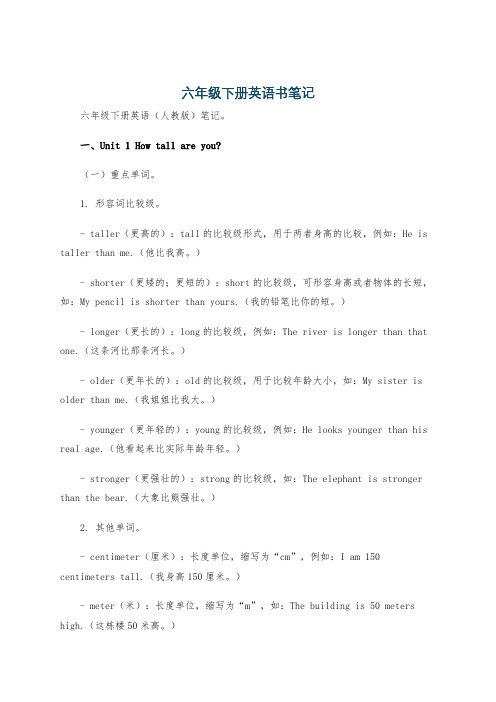
六年级下册英语书笔记六年级下册英语(人教版)笔记。
一、Unit 1 How tall are you?(一)重点单词。
1. 形容词比较级。
- taller(更高的):tall的比较级形式,用于两者身高的比较,例如:He is taller than me.(他比我高。
)- shorter(更矮的;更短的):short的比较级,可形容身高或者物体的长短,如:My pencil is shorter than yours.(我的铅笔比你的短。
)- longer(更长的):long的比较级,例如:The river is longer than that one.(这条河比那条河长。
)- older(更年长的):old的比较级,用于比较年龄大小,如:My sister is older than me.(我姐姐比我大。
)- younger(更年轻的):young的比较级,例如:He looks younger than his real age.(他看起来比实际年龄年轻。
)- stronger(更强壮的):strong的比较级,如:The elephant is stronger than the bear.(大象比熊强壮。
)2. 其他单词。
- centimeter(厘米):长度单位,缩写为“cm”,例如:I am 150 centimeters tall.(我身高150厘米。
)- meter(米):长度单位,缩写为“m”,如:The building is 50 meters high.(这栋楼50米高。
)- kilogram(千克;公斤):重量单位,缩写为“kg”,例如:This bag weighs 5 kilograms.(这个包重5公斤。
)(二)重点句型。
1. 询问身高、长度等。
- How tall are you?(你有多高?)- I'm 1.65 meters.(我身高1.65米。
人教精通版英语六年级下册
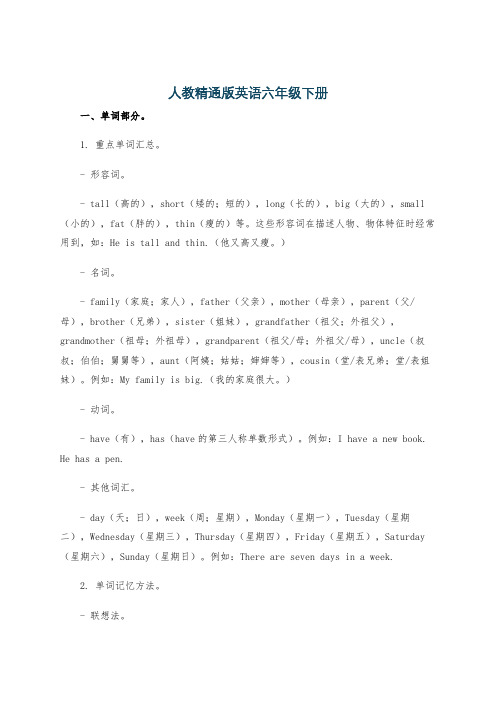
人教精通版英语六年级下册一、单词部分。
1. 重点单词汇总。
- 形容词。
- tall(高的),short(矮的;短的),long(长的),big(大的),small (小的),fat(胖的),thin(瘦的)等。
这些形容词在描述人物、物体特征时经常用到,如:He is tall and thin.(他又高又瘦。
)- 名词。
- family(家庭;家人),father(父亲),mother(母亲),parent(父/母),brother(兄弟),sister(姐妹),grandfather(祖父;外祖父),grandmother(祖母;外祖母),grandparent(祖父/母;外祖父/母),uncle(叔叔;伯伯;舅舅等),aunt(阿姨;姑姑;婶婶等),cousin(堂/表兄弟;堂/表姐妹)。
例如:My family is big.(我的家庭很大。
)- 动词。
- have(有),has(have的第三人称单数形式)。
例如:I have a new book. He has a pen.- 其他词汇。
- day(天;日),week(周;星期),Monday(星期一),Tuesday(星期二),Wednesday(星期三),Thursday(星期四),Friday(星期五),Saturday (星期六),Sunday(星期日)。
例如:There are seven days in a week.2. 单词记忆方法。
- 联想法。
- 对于“family”这个单词,可以联想为“father and mother I love you”每个单词的首字母组成了“family”,这样就很容易记住它的拼写和含义。
- 对比记忆法。
- 像“tall”和“short”,“big”和“small”这样的反义词,可以成对记忆。
通过对比它们的含义和用法,加深对单词的理解。
例如,看到“tall”就想到它的反义词“short”,可以说“A giraffe is tall, but a rabbit is short.”二、句型部分。
小学六年级英语下册重点知识归纳总结

Unit one How tall are you重点单词:Younger更年轻(de),older更年长(de),taller更高(de), shorter更矮(de),更短(de) longer更长(de), thinner更瘦(de), heavier更重(de), bigger更大(de), smaller 更小(de), stronger更强壮(de)重点句子:1.That’s the tallest dinosaur in this hall. 那是这个厅里最高(de)恐龙.2.It’s taller than both of us together. 它比我俩加起来还高.3.How tall are you 你有多高4.I’m metres.我身高米.5.What size are your shoe 你穿多大号 (de)鞋6.Your feet are bigger than mine, my shoes are size 37. 你(de)脚比我(de)大.我穿37号(de)鞋.7.How heavy are you 你(de)体重多少8.I’m 48 kilograms. 我体重48千克.口语交际:A: Look That’s the tallest dinosaur in this hall. 瞧, 那是这个厅里最高(de)恐龙.B; Yes, it is. How tall is it 是啊,它有多高呢A: Maybe 4 metres. 也许有4米吧.B: Wow It’s taller than both of us together. 哇,它比我俩加起来A: Look There are more dinosaurs over there 快看,那边还有很多恐龙.B: They are all so big and tall. 它们都又高又大.A: Hey, this dinosaur isn’t tall I’m taller than this one. 嗨,这个不高啊.我都比它高.B; Oh, yes. How tall are you 是(de),你有多高A: I’m metres. 我身高一米六五呢.二.A: Those shoes in the window are nice Let’s have a look. 橱窗里(de)鞋子好漂亮啊, 我们看看吧.B; What size are your shoes ,Mike 迈克, 你穿多大(de)鞋子A: Size 7. 7码(de).B: Size 7 That’s so small. 7码那也太小了吧.A: In china I wear size 40 shoes. 在中国我穿40码(de).B: Oh, your feet are bigger than mine. My shoes are size 37.哦, 你(de)脚比我(de)大. 我穿37(de).A: Really You look taller than me. 是吗你看起来比我高啊.B: But I think you are heavier. How heavy are you 不过我想你比我重. 你多重A: I’m 48 kilograms. 48千克.B: Yes, you’re heavier, I’m 46 kilograms. 就是比我重. 我46千语法学习:形容词(de)比较级和最高级大多数形容词有三个等级: 原级, 即原形. 比较级, 表示”较….”或”更……一些”. 最高级, 表示”最……”.1.形容词比较级和最高级(de)构成:1)规则变化:2) 不规则变化:2.形容词和副词比较级和最高级(de)用法:Unit two Last weekend重点单词:Cleaned(clean(de)过去式)打扫, stayed(stay(de)过去式)停留,待washed(wash(de)过去式)洗watched(watch(de)过去式)观看, had(have(de)过去式)有; 得病, 患病had a cold 患感冒slept(sleep(de)过去式)睡觉 read(read(de)过去式)读 saw(see(de)过去式)看见 last最后(de); 上一个(de) yesterday 昨天 before 在…之前drank(drink(de)过去式)喝重点句子:1.How was your weekend 你周末过得怎么样2.It was good, thank you. 很好, 谢谢.3.What did you do last weekend 你上周干什么了4.I stayed at home with my grandma. We drank tea in the afternoonand watched TV.我和我奶奶待在家里, 我们喝了下午茶,还看了电视.5.Did you do anything else 你还做了其他什么事6.Yes, I cleaned my room and washed my clothes.是(de), 我打扫了房间, 还洗了衣服.7.I want to buy the new film magazine. 我想买期新(de)电影杂志.8.What did you do last weekend Did you see a film 你上周末干什么了你看电影了吗9.No , I had a cold. I stayed at home all weekend and slept. 没有, 我感冒了. 整个周末都待在家里睡觉.口语交际:A: Hi, grandpa. How are you How was your weekend 爷爷, 你好吗周末过得怎么样B: I’m fine, Mike. It was good, thank you.我很好, 周末很愉快, 谢谢.A: What did you do 你周末做什么了B: Well, I stayed at home with your grandma. We drank tea in the afternoon and watched TV. 我和你奶奶待在家, 喝了下午茶还看了电视.A: I watched TV, too. I watched some children’s shows on TV. 我也看电视了, 我看了动画片.B: That’s nice. Did you do anything else 很好啊, 还干什么了A: Yes , I cleaned my room and washed my clothes. 我还打扫了房间, 洗了衣服.B: You are a good boy 真是个好孩子.语法学习:动词(de)过去式;1.用法: 表示过去发生(de)事情.2.表示: 动词用过去式.3.过去式(de)构成: 规则变化与Unit three where did you go重点单词:Went(go(de)过去式)去; camp野营; went camping去野营; fish钓鱼, 捕鱼; went fishing去钓鱼; rode(ride(de)过去式)骑(马, 自行车) hurt(hurt(de)过去式)(使)受伤; ate(eat(de)过去式)吃; took(take(de)过去式)拍照; took pictures照相; bought(buy(de)过去式)买; gift 礼物; fell(fall(de)过去式)摔倒.重点句子:1.What happened 怎么了2.Are you all right 你还好吧3.I’m OK now. 我现在没事了.4.Where did you go 你去哪儿了5.It looks like a mule. 它看起来像头骡子.6.Did you go to Turpan你们去吐鲁番了吗7.Yes, we did. 是(de), 去了.8.How did you go there 你们怎么去(de)9.Sounds great 听上去不错口语交际:A: What happened怎么了B: I fell off my bike last Saturday and hurt my foot. 我从自行车上摔了下来,伤了脚.A: That’s too bad Are you all right 太糟糕了, 还好吧B: I’m ok now. Come and look at my photos from the Labour Day holiday.现在没事了, 来看看我五一照(de)照片.A: Where did you go 你去哪旅游了B: MT. Tianshan, Xinjiang. I rode a horse. Look, it’s very small. 新疆天山, 我骑马(de)照片,瞧,马很小.A: Oh, yes. It looks like a mule Did you go to Turpan是啊, 它看起来就像头骡子. 你去吐鲁番了吗B: Yes, we did. We saw lots of grapes there, but we couldn’t eat them. They won’t be ready till August. 去了, 在那儿我们见了好多葡萄, 不过我们没有吃. 到八月份才成熟呢.语法学习:不规则动词(de)过去式;eat- ate go- went come- came. take-took, buy- bought. Is-was are-were. fall-fell. Ride- rode. do- did. see-saw. sit-sat. make-made, drink-drank, have-had. Can-could.Unit four then and now重点单词:dining hall 饭厅 grass草坪 gym 草坪 ago以前 cycling 骑自行车运动 go cycling 去骑自行车 ice-skate滑冰 badminton羽毛球运动重点句子:1.There was no library in my old school. 我以前(de)学校里没有图书馆.2.Tellme about your school, please. 请给我讲讲你(de)学校吧.3.How do you know that 你怎么知道(de)4.There were no computers or internet in my time. 我那时候没有电脑也没有网络.5.Before, I was quiet. Now, I’m very active in class. 以前我很安静. 现在我在课堂上很活跃.6.I was short, so I couldn’t ride my bike well. Now, I go cyclingeveryday. 我以前个子小, 自行车骑得不会. 现在我天天骑车.口语交际:A: Wow, a library There was no library in my old school. 哇,图书馆. 我以前(de)学校可没图书馆.B: Tell me about your school, please. 那么请你讲讲你们学校吧. A: There was only one small building on a hill. 就是山上一座小房子而已.C: Could you see stars at night 晚上你可以看到星星吗A: Yes, I liked stars.是(de). 我喜欢星星.B: Me too. One day I’m going to visit the moon. 我也喜欢. 总有一天我要去月亮上面.C: The Americans took about five days to get there in 1969. 1969年美国人就去过月球呢, 花了5天时间.B: How do you know that 你怎么知道(de)C: Easy, I looked it up on the internet. 很简单, 上网查(de). A: Ah There were no computers or internet in my time. 哈, 我们那时候可没有电脑,也没有网络.综合复习:另见小学重点语法汇总.今后会陆续推出.。
- 1、下载文档前请自行甄别文档内容的完整性,平台不提供额外的编辑、内容补充、找答案等附加服务。
- 2、"仅部分预览"的文档,不可在线预览部分如存在完整性等问题,可反馈申请退款(可完整预览的文档不适用该条件!)。
- 3、如文档侵犯您的权益,请联系客服反馈,我们会尽快为您处理(人工客服工作时间:9:00-18:30)。
六年级下册重点单词及句子Unit 1younger更年轻的older更年长的taller更高的shorter更矮的bigger更大的smaller更小的thinner更瘦的heavier更重的longer更长的stronger更强壮的重点句型--How tall are you?--你有多高?--I’m 1.65 metres.--I am 1.65 metres.--我身高1.65米。
--How heavy are you?--I’m 48 kilograms.--I am 48 kilograms.--你有多重?--我体重48公斤。
--What size are your shoes?--Size 7.--你穿多大号的鞋?--七号。
Your feet are bigger than mine.My shoes are size 37.你的脚比我的大。
我穿37号的鞋。
That’s the tallest dinosaur in this hall.那是厅里最高的恐龙。
It’s taller than both of us together.它比我两加起来还高。
Unit 2(clean)cleaned my room打扫房间(read)read a book看书(wash)washed my clothes洗衣服(see)saw a film看电影(stay)stayed at home待在家(have)had a cold感冒(watch)watched TV看电视(sleep)slept睡觉last weekend上周末yesterday昨天last night昨晚the day before yesterday 前天last Monday上周一--How was your weekend?--It was good, thank you.--你周末过得怎么样?--很好,。
--What did you do?--I stayed at home with your grandma. We drank tea inthe afternoon and watched TV.--你干什么了?--我和你奶奶待在家里。
我们喝了下午茶,还看了电视。
--Did you do anything else?--Yes, I cleaned my room and washed my clothes.--你还做了其他事吗?--是的,我打扫房间,还洗了衣服。
--What did you do last weekend? Did you see a film?--No, I had a cold. I stayed at home all weekend and slept.--你上周末干了什么?你看电影了吗?--没有,我感冒了。
整个周末都待在家里睡觉。
I want to buy the new film magazine.我想买期新的电影杂志。
Unit 3(ride)rode a horse骑马(hurt)hurt my foot伤到脚(ride)rode a bike骑自行车(eat)ate fresh food吃新鲜食物(go)went camping去野营(take)took pictures拍照(go)went fishing去钓鱼(buy)bought gifts买礼物(go)went swimming去游泳far from远离重点句型--What happened?--I fell off my bike and hurt my foot.--怎么了?--我从自行车上摔下来然后伤到脚了。
--Are you all right?--I’m OK now.你还好吧?我现在没事了。
--Where did you go?--(My family and) I went to Sanya.你去哪儿了?我(和我家人)去。
--Did you fo to Turpan?--Yes, we did.你(们)去吐鲁番了吗?是的,去了。
--How did you go there?--We went there y plane.你们怎么去的?我们坐飞机去的。
It looks like a mule.它看起来像骡子。
Sounds great!听起来不错!Unit 4dining hall饭厅cycling骑自行车运动grass草坪go cycling去骑自行车gym体育馆ice-skate滑冰ago以前play badminton打羽毛球…years ago…年以前last year去年...months ago…月以前last month上个月Tell us about your school, please. 请给我们讲讲您的学校吧。
There was no library in my old school.我以前的学校里没有图书馆。
There were no computers or Internet in my time.我那时候没有电脑也没有网络。
Before, I was quiet. Now, I’m (I am) very active in class.以前我很安静。
现在我在课堂上很活跃。
I was short, so I couldn’t ride my bike well. Now, I go cycling everyday.我以前个子小,自行车骑得不好。
现在我天天骑车。
--How do you know that?--Easy, I looked it up on the Internet. --你怎么知道的?--很容易,我上网查阅的。
六年级上册重点单词及句子Unit 1science科学turn转弯museum博物馆left左post office邮局right右bookstore书店straight笔直地cinema电影院go straight直走hospital医院turn left转左crossing十字路口turn right转右--Where is the museum shop?--It’s near the door.--It’s next to the bookstore.--博物馆的商店在哪儿?--在大门附近。
--在书店旁边。
--How can we get there?--Turn left at the bookstore.--By bus.--我们怎么到哪儿?--到书店左转。
--乘公共汽车。
The bookstore is on the left.书店在左边。
The bookstore is on the right.书店在右边。
Unit 2on foot步行slow慢的by bus乘公共汽车down减少by plane乘飞机slow down慢下来by taxi乘计程车stop停下by ship乘船wait等待by subway乘地铁walk/go走by train乘火车--How do you come to school?--Usually, I come on foot.--你怎么来学校的?--通常我走路来。
In the USA people on bikes must wear one.(a helmet)--在美国骑自行车的人必须戴(头盔)Don’t go at the red light!别闯红灯!I must pay attention to the traffic lights!我必须注意交通信号灯!Slow down and stop at a yellow light.黄灯要慢下来和停下来。
Stop and wait at a red light.红灯要停下来等待。
Go at a green light.绿灯行。
Unit 3visit my grandparents探望我的爷爷奶奶dictionary字典see a film看电影comic book连环画册take a trip去旅行word book单词书go to the supermarket去商场postcard明信片this morning今天早上tomorrow明天this afternoon今天下午next week下周this evening今天晚上tonight今晚--What are you going to do tomorrow?--I’m going to have an art lesson.--We’re going to draw some pictures in Renmin Park. --你明天打算做什么?--我要上美术课。
--我们要到人民公园去画画。
--Where are you going?--We’re going to the cinema.--你们打算去哪儿?--我们打算去电影院。
--When are you going? --Next Wednesday.--你们什么时候去?--下周三。
Unit 4dancing(dance)跳舞singing(sing)唱歌reading(read) stories看故事playing(play) football踢足球doing(do)kung fu打功夫cooks(cook) Chinese food煮中国菜studies(study) Chinese学语文does (do)word puzzles猜字谜goes(go) hiking去远足--What are Peter’s hobbies?--He likes reading stories.--彼特有什么爱好?--他喜欢读故事。
--Does he live in Sydney?--No, he doesn’t. --他住在悉尼吗?--不,他没有。
--Does he like doing word puzzles and going hiking?--Yes, he does.--他喜欢猜字谜和远足吗?--是的,他喜欢。
Unit 5factory工厂police officer警察worker工人fisherman渔民factory worker工厂工人scientist科学家postman邮递员pilot飞行员businessman商人coach教练--What does he do?--他是做什么的?--He’s a businessman.--他是商人。
--Where does he work?--He works at sea.--他在哪儿工作?--他在海上工作。
--How does he go to work? --He goes to work by bike. --他怎么上班?--他骑自行车上班。
